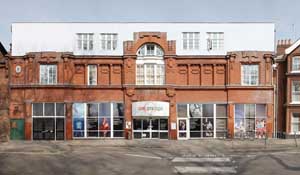Reinventing touring
A group of programmers and producers based in the South East is developing a more generous, collaborative model for touring theatre. Gavin Stride explains how

The main challenge in touring theatre is less about artists making work – in many ways the easy part – but about how artists make a living from the things they produce. This is why a group of programmers and producers based across the South East of England have been exploring ways of better connecting the first two of the five ambitions set out in Arts Council England’s (ACE’s) ten-year strategy – supporting artists and building audiences – in the belief that if we achieve this we might go some way to meeting the third of their ambitions – creating resilience.
The initiative, named ‘house’, is led by a group of eight producers and programmers comprising Brighton Dome, Farnham Maltings, Newbury Corn Exchange, New Theatre Royal Portsmouth, Oxford Playhouse, South Street Reading, The Point Eastleigh and Theatre Royal Margate. At the outset the organisations agreed that whatever we did, it couldn’t be about us. We would act as a steering group that will work with all those good and purposeful communities and organisations that have an appetite for building an audience for theatre but who sit outside ACE’s new National Portfolio arts infrastructure. We also agreed that we would be programmer-led. Whilst many of us continue to produce and support artists, house is going to start by identifying the ambitions and challenges of venues and work from there. And we intend to be demand led. We will start a conversation with every part of the East and South East of England and work with those who want to work with us.
Some of what we will be doing is to take models that have worked in the past and explore how we might use them now, such as the old ‘guarantee against loss’ schemes. Over the past five years there has been a move away from fees to box office splits which shifts the risk from the venues, which have the relationship with their audience, to the companies, who usually have an income target to meet within an ACE Grants for the Arts Award. We want to create a model in which both worry less about money and more about developing a shared ambition, so we will underwrite the fees of a range of work and take a percentage of the box office in return. For our part we will expect things of the company and venue, such as programmers being there on the night, ensuring venues have publicity in advance, sharing intelligence about the audience, etc. Our belief is that it will quickly become apparent which organisations are able and willing to get an audience and who might need additional support – which we will give – whether in marketing or thinking about how the space is used.
house is led by Mark Makin, supported by an administrator. It is his challenge to listen, reinvent, discover and champion our collective ambition. We want to ensure that through his and our efforts better work gets to more audiences. We will encourage and invest in groups of programmers to jointly tour, co-present, buddy with producing theatres and co-commission work for their audience, in the belief that if a venue and programmer are involved in the process they will work harder at getting an audience. We have said that we will build active programming relationships with 25 venues in the first year, 50 by year two and that we would expect to be touring 20 to 25 shows – not all to every venue – generating 200 events in year one. It’s worth saying that we are making this up… based on an unshakable belief that we need to do something to better distribute the best theatre. It makes economic, artistic and organisational sense. If we get to more people, or think of new ideas, or find better way of achieving our ambition, we will adapt and change.
Finally we will work at building the regional ecology. Others have demonstrated the value of using a digital platform to strengthen the relationship between artists, venues and audiences. Both Theatre Bristol and the National Theatre of Wales feel like they are driven by the arts community itself. We also looked at international models like Cyberpaddock in Australia and atlanticpresenters in Canada. From this we have set up housetheatre.org.uk as a way of starting the same conversations across the East and South East of England.
Join the Discussion
You must be logged in to post a comment.